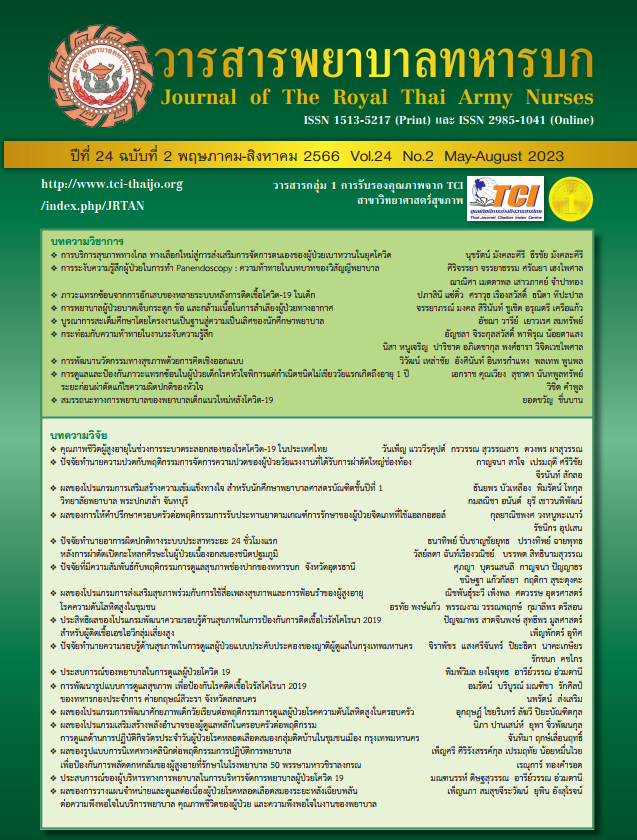Nurses’ Experiences of Caring for Patients with COVID-19
Keywords:
Nursing care, Nurses’ experiences, Patients with Covid-19Abstract
The purpose of this study is to describe nurse’s experiences of caring for patients with COVID-19. Martin Heidegger was applied as a research methodology. Study informants were 15 nurses working at COVID-19 units in a selected hospital, during January 2021-July 2022. In-depth interview with tape-record with fieldnote were use as data collection method. All interviews were transcribed verbatim and analyzed by using content analysis of van Manen’s method, Verify the reliability of the information according to the methods of Lincoln and Guba
The findings of nurse’s experiences of caring for patients with COVID-19 consist of 7 themes including 1) providing physical comfort to patients 2) giving psychological support to fight with vigorous disease 3) requiring closed monitoring due to unpredictable changes of signs and symptoms 4) providing things as patients’ needs, 5) paying attention of patients’ health coverages 6) negotiating for assistance with health related department and 7) taking care the last moment of patient’s life with other health related
Downloads
References
Department of disease control, Ministry of Public Health. Handbook of health workers in emergency response cases Coronavirus disease 2019 epidemic in Thailand. Department of disease control; 2020. (in Thai)
Department of disease control, Ministry of Public Health. Coronavirus disease 2019 (COVID-19) situation, Public health and barriers to disease prevention and control among travelers. Department of Emerging infectious disease; 2021. (in Thai)
Infectious Diseases Association of Thailand. Clinical Characteristics of Corona-19 Patients (COVID-19); 2020. (in Thai)
Yueanjai A. Coronavirus disease 2019 infectious disease patients report. Siriraj Medical Records with patient reports; 2021. (in Thai)
Sun et al. A qualitative study on the psychological experience of caregivers of COVID-19 patients. American Journal of Infection Control.; 2020; 48: 592-98.
Liu et al. The experiences of health-care providers during the COVID-19 crisis in China: a qualitative study. Lancet Infectious diseases. 2020 20(8): 790–98.
Chen et al. Initiation of a new infection control system for the COVID-19 outbreak. Lancet Infectious diseases. 2020 20(4): 397-98.
Heidegger M. Being and Time. New Haven, CT: Yale university 1962.
Oumtanee A. Qualitative research for nursing. Bangkok: Chulalongkorn University Printing House; 2010. (in Thai)
Manen V. Phenomenology of Practice: Meaning-Giving Methods in Phenomenological Research and Writing (2nd). New York: Taylor & Francis, 2016.
Lincoln YS, Guba EG. Naturalistic Inquiry. Beverly Hills, CA : Sage Publication; 1985.
Deepaisarnsakul P. Expectations and perceptions of service recipients towards hospital service quality. Veridian E-Journal,2013 6(1): 573-92. (in Thai)
Patteeranon P, Sriyoha N, Sripasarn P, Saowanee R. The role of community nurses in health promotion and prevention the outbreak of coronavirus disease 2019 in 8 communities area of responsibility of Ramathibodi Hospital. Health Education Journal; 2021; 44(1): 1-11. (in Thai)
Apiradeeseth N, Noawapanith S, Sooksamai J, Tewlohaarn C, Kwanmuang R. Preparation for the development of nurses’ competency in caring for patients with COVID-19. Siriraj Medical Journal; 2021;14(4):81-90. (in Thai)
Subwongjareon N . The role of nurses in palliative care in tertiary care hospitals . Royal Thai Army Nursing Journal; 2019; 21(1): 26-34. (in Thai)
Downloads
Published
How to Cite
Issue
Section
License
Copyright (c) 2023 Journal of The Royal Thai Army Nurses

This work is licensed under a Creative Commons Attribution-NonCommercial-NoDerivatives 4.0 International License.
บทความหรือข้อคิดเห็นใดใดที่ปรากฏในวารสารพยาบาลทหารบกเป็นวรรณกรรมของผู้เขียน ซึ่งบรรณาธิการหรือสมาคมพยาบาลทหารบก ไม่จำเป็นต้องเห็นด้วย
บทความที่ได้รับการตีพิมพ์เป็นลิขสิทธิ์ของวารสารพยาบาลทหารบก
The ideas and opinions expressed in the Journal of The Royal Thai Army Nurses are those of the authors and not necessarily those
of the editor or Royal Thai Army Nurses Association.






